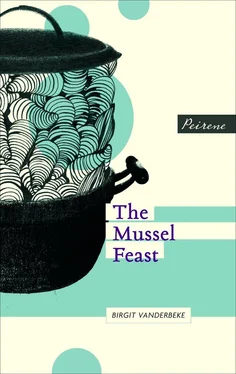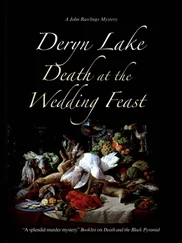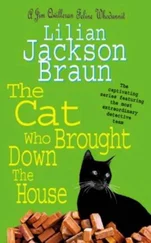Birgit Vanderbeke - The Mussel Feast
Здесь есть возможность читать онлайн «Birgit Vanderbeke - The Mussel Feast» весь текст электронной книги совершенно бесплатно (целиком полную версию без сокращений). В некоторых случаях можно слушать аудио, скачать через торрент в формате fb2 и присутствует краткое содержание. Год выпуска: 2013, Издательство: Peirene Press, Жанр: Современная проза, на английском языке. Описание произведения, (предисловие) а так же отзывы посетителей доступны на портале библиотеки ЛибКат.
- Название:The Mussel Feast
- Автор:
- Издательство:Peirene Press
- Жанр:
- Год:2013
- ISBN:нет данных
- Рейтинг книги:3 / 5. Голосов: 1
-
Избранное:Добавить в избранное
- Отзывы:
-
Ваша оценка:
- 60
- 1
- 2
- 3
- 4
- 5
The Mussel Feast: краткое содержание, описание и аннотация
Предлагаем к чтению аннотацию, описание, краткое содержание или предисловие (зависит от того, что написал сам автор книги «The Mussel Feast»). Если вы не нашли необходимую информацию о книге — напишите в комментариях, мы постараемся отыскать её.
A mother and her two teenage children sit at the dinner table. In the middle stands a large pot of cooked mussels. Why has the father not returned home? As the evening wears on, we glimpse the issues that are tearing this family apart.
"I wrote this book in August 1989, just before the fall of the Berlin Wall. I wanted to understand how revolutions start. It seemed logical to use the figure of a tyrannical father and turn the story into a German family saga."
The Mussel Feast — читать онлайн бесплатно полную книгу (весь текст) целиком
Ниже представлен текст книги, разбитый по страницам. Система сохранения места последней прочитанной страницы, позволяет с удобством читать онлайн бесплатно книгу «The Mussel Feast», без необходимости каждый раз заново искать на чём Вы остановились. Поставьте закладку, и сможете в любой момент перейти на страницу, на которой закончили чтение.
Интервал:
Закладка:
I don’t know what would have happened if we’d been able to eat at six o’clock as usual. It’s astonishing how people react when the routine is disturbed, a tiny delay to the normal schedule and at once everything is different — and I mean everything: the moment a random event occurs, however insignificant, people who were once stuck together fall apart, all hell breaks loose and they tear each other’s heads off, still alive if possible; terrible violence and slaughter, the fiercest wars ensue because, by pure accident, not everything is normal. Broadly speaking, that’s what happened. Occasionally, although not until afterwards, we said that maybe we would have stuck together like the real family we had pretended to be if the delay to our routine hadn’t occurred. Maybe even if the telephone had rung earlier; but in fact the phone rang much later, by which time the delay was a few hours rather than just two, although two hours might have been enough to destroy the family; as I’ve said, even small delays can lead to the greatest calamities. Once, in the past, our family unity was endangered when Mum forgot the salt on holiday. We always brought hard-boiled eggs for our trip, my mother put salt into a little paper parchment bag, and if anybody wanted a hard-boiled egg in the car she’d give them the salt bag; hard-boiled eggs taste revolting without salt, they don’t go down well without salt. On one occasion, however, she forgot it amidst all the packing, and there were eight eggs, two each, but no salt as a proper family should have with them on holiday; this is the end, we all thought.
We didn’t watch the news that evening, either; it had gone eight o’clock and nobody thought of switching on the television. We sat at the table with an eerie sensation because things weren’t normal. Had we turned on the television we’d just have been pretending; the evening had stopped being normal long before then, but it became even less normal; the abnormal situation that existed shortly after eight o’clock — with their low specific-heat capacity the mussels had long gone cold — was made even more abnormal by our failure to watch the news as usual; we intensified the abnormality in whichever way we could.
And so the mood turned sour and toxic, which is why all of sudden I said out loud what up till then I’d been quietly thinking to myself: he really knows how to spoil the mood. This abnormality, you see, had taken me right out of the celebratory mood we had forced ourselves into; only now did I realize I hadn’t been in that mood spontaneously, I’d put it on like a dress because we had to stop letting our hair down in preparation for my father’s return; and then my mother said, if he came now we would really spoil his mood because we’re not being celebratory. Now all three of us had said it, we were no longer worried that one of us might blab to my father later; and my brother said, we always spoil his mood anyway, which was true, because my father’s mood was completely spoiled whenever he heard that my brother had received another Four at school; I often lied and unfortunately he often found out that I’d lied, and that he couldn’t abide. Having to get to the bottom of the truth in the evenings — even if he could see and enjoy the beauty of logical conclusions — as well as meting out punishments and restoring order in his family, spoiled my father’s mood until long after the news. We said we’d ruined his whole life, and he said it too, this endless disappointment with my family is ruining my life; his family represented nothing but a disappointment to him, especially his children; but my mother, too, must have been a continual disappointment. She may have acted all jolly at half past five, but just before she’d dash into the bathroom to backcomb her hair; my mother’s hair is fine and soft and, despite the perm, her hair collapses when she’s exhausted and it looks sad. She wasn’t particularly good at backcombing because backcombing didn’t interest her; she didn’t think you needed a backcombed hairdo to look beautiful, and sometimes she tried to fix her hair with hairspray, but to no avail, her hairdo collapsed regardless. She’d quickly put on some lipstick, too, and as it had to happen so quickly, when she opened the door and my father came in she’d often have lipstick on her teeth, and the sight spoiled my father’s mood altogether, because the ladies in his office, his secretary for example, were pure eye-candy. One weekend he stood at the window and tears came to his eyes when he saw boys playing football outside; my father had played football, too, as a boy; in fact he played it very well, everything my father did he did very well. So he saw the boys playing, my brother was playing with them, but my brother was not very good at football; actually he just stood on the side looking awkward and clumsy, hoping that the others would forget he was there and not pass to him. Sometimes he pretended to run a bit in the wrong direction, to avoid looking as if he was rooted to the sidelines, and my father stood at the window, behind the dining-room curtain, and he saw how awkward and clumsy my brother was, and how dreadfully afraid of the ball he was, and my father even said, he’s running away from the ball, and tears came to his eyes; that’s supposed to be my son, he said to my mother, that’s really the biggest disappointment. The fact that my brother was good at volleyball didn’t help one jot — all the training, he made a real effort — the disappointment was simply too great for my father. He couldn’t stand wimpishness, the wimpishness of my brother and mother, flowery souls, he called them. My father was sporty and harboured sporting ideals, competitive ones; he would have counted competitiveness among his sporting ideals. And luckily I was sporty and my father assumed that I harboured sporting ideals and was competitive, too, which wasn’t true, but he didn’t realize this at first, so at least I didn’t ruin his life by being unsporty. Instead I ruined it with my bandy legs. I inherited them from him; they’re not bad on a man or a footballer, but on a girl they look absolutely dreadful; besides, I had spots. I was, however, always good at school; you inherited your ambition from me, my father said, you’ll be successful one day, please do me a favour and make something of yourself; in fact I was very ambitious and always received Ones for my homework and in my school reports. I didn’t want to be like my brother, who utterly ruined my father’s life with his Fours; my father simply couldn’t tolerate being disgraced by his own flesh and blood. My brother never managed to lie; I could, even though I never got any Fours; I did, however, earn extra cash on the sly by tutoring younger children — we had very little pocket money — and with my extra cash I went to the cinema on the sly and spent entire days in cafés; I was good at school so I could hide the fact that I was earning cash and spending it in cafés, not to mention cinemas. My father himself loved going to the cinema when he was young; he really loved going to the cinema because at home we children just screamed all day long, me more than my brother, and then when he studied in Berlin, he loved going too. He utterly detested the small provincial town where we first lived, it wasn’t cosmopolitan enough for him and the cinema offered the only escape. I liked going to the cinema, too, but I preferred not to say it out loud, instead I said that we had games in period thirteen, which was a lie. There was no period thirteen, school was long finished for the day when I came back late, but nobody noticed. I spent days tutoring younger children, sitting in cinemas and cafés, smoking cigarettes and reading books, and didn’t go home until after period thirteen, which didn’t exist. At any rate, it was easier for me to lie than my brother; our test results at school had to be signed by a parent, and my mother always said that our father should sign them; in the evening she would tell my father, and my brother couldn’t escape. Mum felt bad afterwards when my brother ran from the living room, sobbing and with a bloody nose, and she sobbed the whole time as she heard my father yelling in the living room. Basically she felt bad about having to disappoint my father and about my brother’s bloody nose, which was a consequence of this disappointment. My father reproached her, too; after all, he couldn’t keep an eye on everything; of course a mother is to blame if her son is so bone idle that he only manages Fours; his lack of intelligence can’t be down to me, my father said, you see my father’s an intelligent man, so the failure couldn’t be down to him. But perhaps, my father said, the reason he’s stupid and idle may have something to do with the fact that my mother was not regarded as particularly intelligent in the family; maybe this was the reason I, at least, was regarded as intelligent, but that was cold comfort to him, because a man wants to be proud of his son, doesn’t he. In a proper family, which my father longed for us to be, the father is proud of his son, and my brother ought to have made more of an effort, but he didn’t; I can do what I like, it won’t work, my brother always said. Anyhow, it wasn’t easy to impress our father, because he was very good at everything he did; my father was a good sportsman and scientist, but music, which my brother may have veered towards, was not important; my father would have been pained by such effeminacy in his only son, such daydreaming makes his heart bleed and spoils his mood.
Читать дальшеИнтервал:
Закладка:
Похожие книги на «The Mussel Feast»
Представляем Вашему вниманию похожие книги на «The Mussel Feast» списком для выбора. Мы отобрали схожую по названию и смыслу литературу в надежде предоставить читателям больше вариантов отыскать новые, интересные, ещё непрочитанные произведения.
Обсуждение, отзывы о книге «The Mussel Feast» и просто собственные мнения читателей. Оставьте ваши комментарии, напишите, что Вы думаете о произведении, его смысле или главных героях. Укажите что конкретно понравилось, а что нет, и почему Вы так считаете.












